The Purpose of Education: An In-depth Analysis from Teacher's View
VerifiedAdded on 2023/06/11
|10
|2349
|358
Essay
AI Summary
This essay delves into the purpose of education from a teacher's perspective, emphasizing its role in transforming lives and addressing social injustices. It discusses the importance of schools as social institutions that equip students with life skills and enable them to realize their potential. The essay explores different educational philosophies, including conservative and progressive education, and their approaches to literacy and social engagement. It also addresses the significance of cultural diversity, national unity, and the qualities of effective 21st-century teachers. The author reflects on their role as a teacher, highlighting the importance of understanding student development, employing diverse teaching strategies, and fostering inclusive classroom environments. Ultimately, the essay advocates for a holistic approach to education that promotes intellectual engagement, connects with students' lives, and supports their development as active and responsible global citizens.
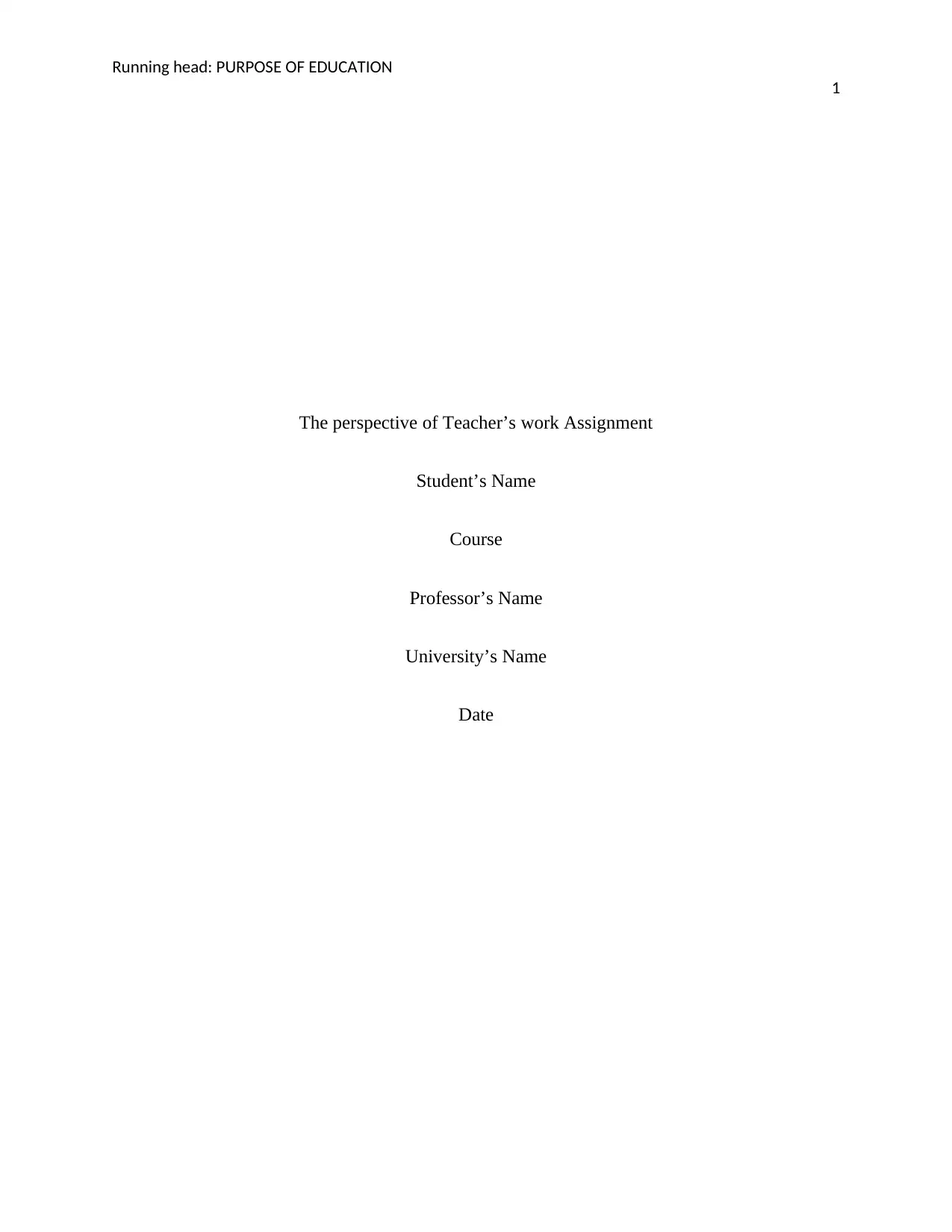
Running head: PURPOSE OF EDUCATION
1
The perspective of Teacher’s work Assignment
Student’s Name
Course
Professor’s Name
University’s Name
Date
1
The perspective of Teacher’s work Assignment
Student’s Name
Course
Professor’s Name
University’s Name
Date
Paraphrase This Document
Need a fresh take? Get an instant paraphrase of this document with our AI Paraphraser
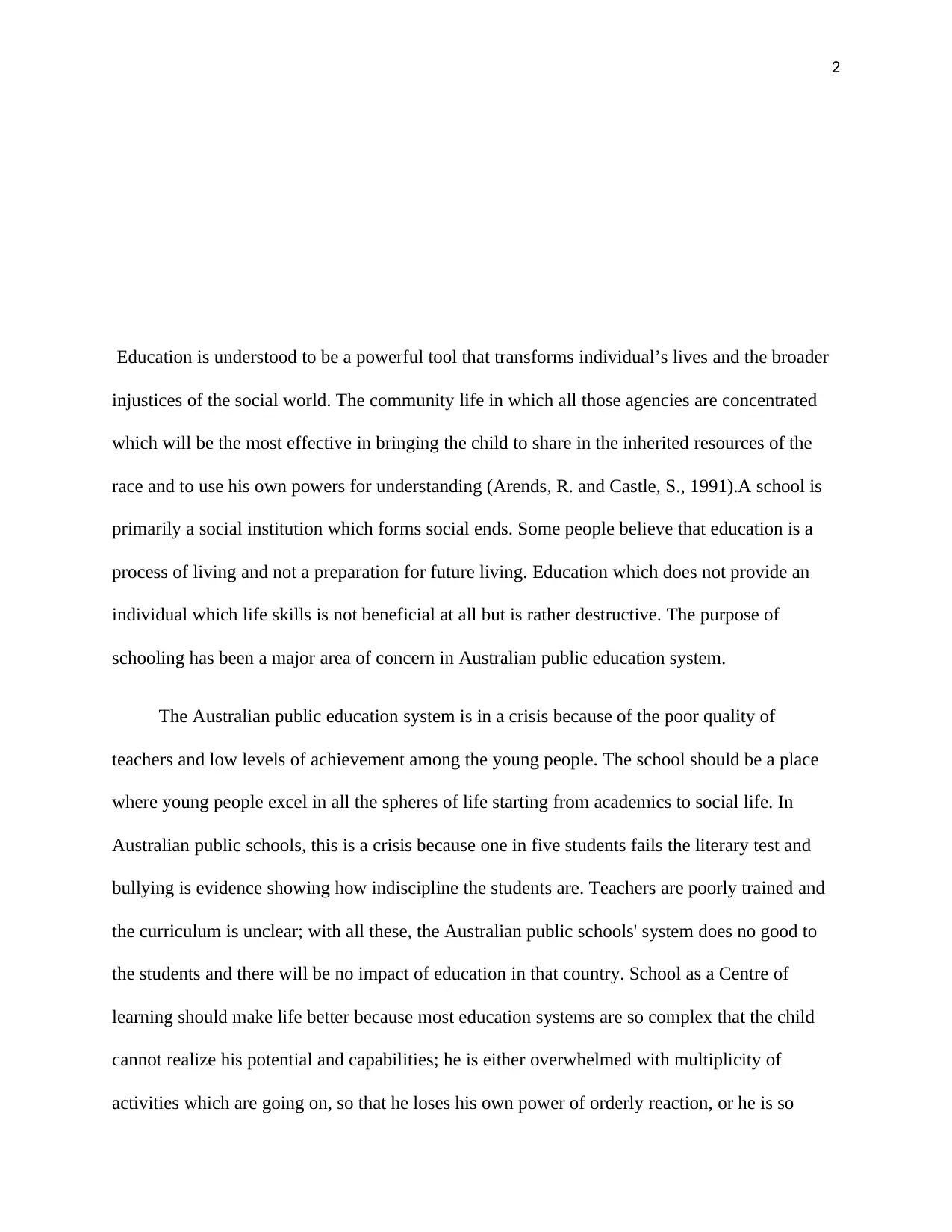
2
Education is understood to be a powerful tool that transforms individual’s lives and the broader
injustices of the social world. The community life in which all those agencies are concentrated
which will be the most effective in bringing the child to share in the inherited resources of the
race and to use his own powers for understanding (Arends, R. and Castle, S., 1991).A school is
primarily a social institution which forms social ends. Some people believe that education is a
process of living and not a preparation for future living. Education which does not provide an
individual which life skills is not beneficial at all but is rather destructive. The purpose of
schooling has been a major area of concern in Australian public education system.
The Australian public education system is in a crisis because of the poor quality of
teachers and low levels of achievement among the young people. The school should be a place
where young people excel in all the spheres of life starting from academics to social life. In
Australian public schools, this is a crisis because one in five students fails the literary test and
bullying is evidence showing how indiscipline the students are. Teachers are poorly trained and
the curriculum is unclear; with all these, the Australian public schools' system does no good to
the students and there will be no impact of education in that country. School as a Centre of
learning should make life better because most education systems are so complex that the child
cannot realize his potential and capabilities; he is either overwhelmed with multiplicity of
activities which are going on, so that he loses his own power of orderly reaction, or he is so
Education is understood to be a powerful tool that transforms individual’s lives and the broader
injustices of the social world. The community life in which all those agencies are concentrated
which will be the most effective in bringing the child to share in the inherited resources of the
race and to use his own powers for understanding (Arends, R. and Castle, S., 1991).A school is
primarily a social institution which forms social ends. Some people believe that education is a
process of living and not a preparation for future living. Education which does not provide an
individual which life skills is not beneficial at all but is rather destructive. The purpose of
schooling has been a major area of concern in Australian public education system.
The Australian public education system is in a crisis because of the poor quality of
teachers and low levels of achievement among the young people. The school should be a place
where young people excel in all the spheres of life starting from academics to social life. In
Australian public schools, this is a crisis because one in five students fails the literary test and
bullying is evidence showing how indiscipline the students are. Teachers are poorly trained and
the curriculum is unclear; with all these, the Australian public schools' system does no good to
the students and there will be no impact of education in that country. School as a Centre of
learning should make life better because most education systems are so complex that the child
cannot realize his potential and capabilities; he is either overwhelmed with multiplicity of
activities which are going on, so that he loses his own power of orderly reaction, or he is so
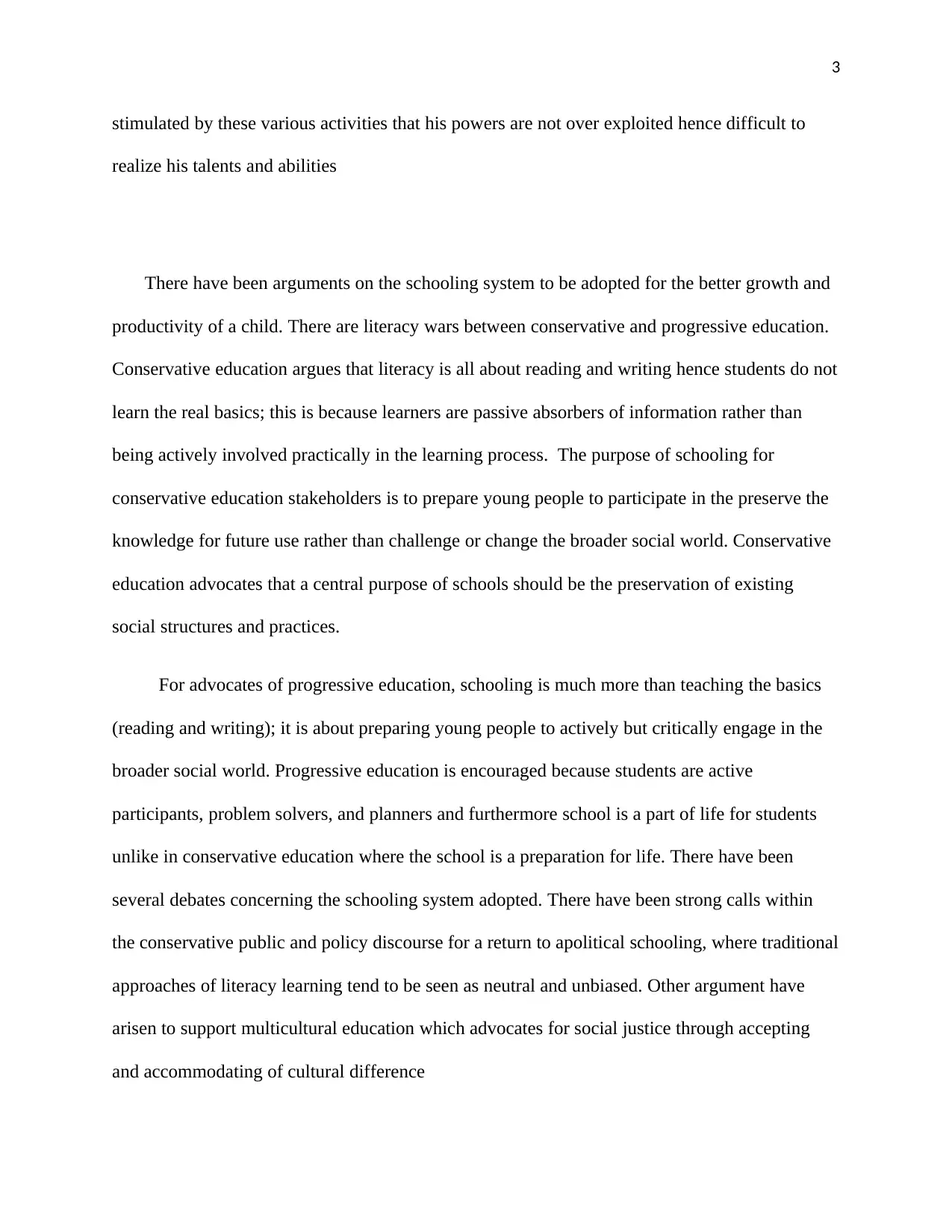
3
stimulated by these various activities that his powers are not over exploited hence difficult to
realize his talents and abilities
There have been arguments on the schooling system to be adopted for the better growth and
productivity of a child. There are literacy wars between conservative and progressive education.
Conservative education argues that literacy is all about reading and writing hence students do not
learn the real basics; this is because learners are passive absorbers of information rather than
being actively involved practically in the learning process. The purpose of schooling for
conservative education stakeholders is to prepare young people to participate in the preserve the
knowledge for future use rather than challenge or change the broader social world. Conservative
education advocates that a central purpose of schools should be the preservation of existing
social structures and practices.
For advocates of progressive education, schooling is much more than teaching the basics
(reading and writing); it is about preparing young people to actively but critically engage in the
broader social world. Progressive education is encouraged because students are active
participants, problem solvers, and planners and furthermore school is a part of life for students
unlike in conservative education where the school is a preparation for life. There have been
several debates concerning the schooling system adopted. There have been strong calls within
the conservative public and policy discourse for a return to apolitical schooling, where traditional
approaches of literacy learning tend to be seen as neutral and unbiased. Other argument have
arisen to support multicultural education which advocates for social justice through accepting
and accommodating of cultural difference
stimulated by these various activities that his powers are not over exploited hence difficult to
realize his talents and abilities
There have been arguments on the schooling system to be adopted for the better growth and
productivity of a child. There are literacy wars between conservative and progressive education.
Conservative education argues that literacy is all about reading and writing hence students do not
learn the real basics; this is because learners are passive absorbers of information rather than
being actively involved practically in the learning process. The purpose of schooling for
conservative education stakeholders is to prepare young people to participate in the preserve the
knowledge for future use rather than challenge or change the broader social world. Conservative
education advocates that a central purpose of schools should be the preservation of existing
social structures and practices.
For advocates of progressive education, schooling is much more than teaching the basics
(reading and writing); it is about preparing young people to actively but critically engage in the
broader social world. Progressive education is encouraged because students are active
participants, problem solvers, and planners and furthermore school is a part of life for students
unlike in conservative education where the school is a preparation for life. There have been
several debates concerning the schooling system adopted. There have been strong calls within
the conservative public and policy discourse for a return to apolitical schooling, where traditional
approaches of literacy learning tend to be seen as neutral and unbiased. Other argument have
arisen to support multicultural education which advocates for social justice through accepting
and accommodating of cultural difference
⊘ This is a preview!⊘
Do you want full access?
Subscribe today to unlock all pages.

Trusted by 1+ million students worldwide
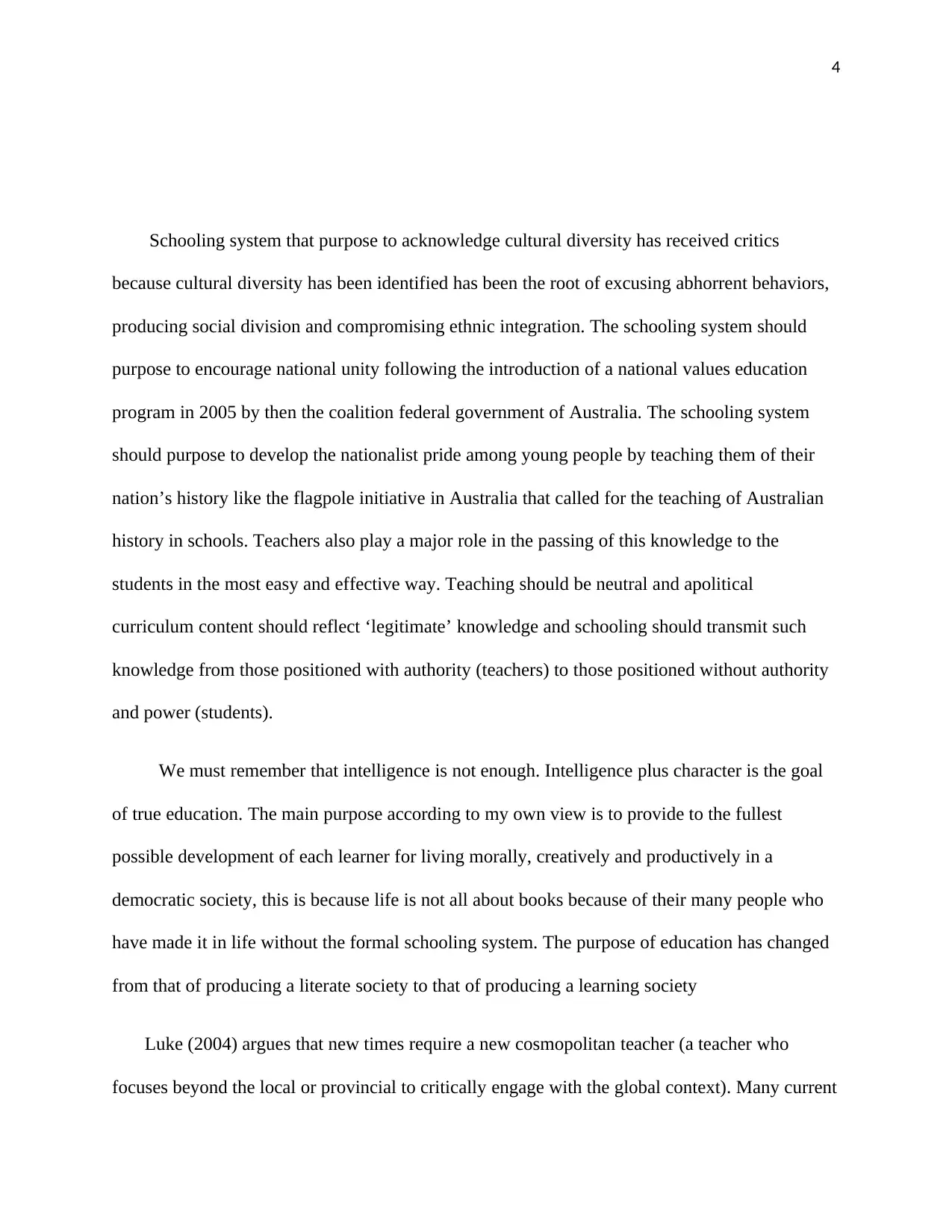
4
Schooling system that purpose to acknowledge cultural diversity has received critics
because cultural diversity has been identified has been the root of excusing abhorrent behaviors,
producing social division and compromising ethnic integration. The schooling system should
purpose to encourage national unity following the introduction of a national values education
program in 2005 by then the coalition federal government of Australia. The schooling system
should purpose to develop the nationalist pride among young people by teaching them of their
nation’s history like the flagpole initiative in Australia that called for the teaching of Australian
history in schools. Teachers also play a major role in the passing of this knowledge to the
students in the most easy and effective way. Teaching should be neutral and apolitical
curriculum content should reflect ‘legitimate’ knowledge and schooling should transmit such
knowledge from those positioned with authority (teachers) to those positioned without authority
and power (students).
We must remember that intelligence is not enough. Intelligence plus character is the goal
of true education. The main purpose according to my own view is to provide to the fullest
possible development of each learner for living morally, creatively and productively in a
democratic society, this is because life is not all about books because of their many people who
have made it in life without the formal schooling system. The purpose of education has changed
from that of producing a literate society to that of producing a learning society
Luke (2004) argues that new times require a new cosmopolitan teacher (a teacher who
focuses beyond the local or provincial to critically engage with the global context). Many current
Schooling system that purpose to acknowledge cultural diversity has received critics
because cultural diversity has been identified has been the root of excusing abhorrent behaviors,
producing social division and compromising ethnic integration. The schooling system should
purpose to encourage national unity following the introduction of a national values education
program in 2005 by then the coalition federal government of Australia. The schooling system
should purpose to develop the nationalist pride among young people by teaching them of their
nation’s history like the flagpole initiative in Australia that called for the teaching of Australian
history in schools. Teachers also play a major role in the passing of this knowledge to the
students in the most easy and effective way. Teaching should be neutral and apolitical
curriculum content should reflect ‘legitimate’ knowledge and schooling should transmit such
knowledge from those positioned with authority (teachers) to those positioned without authority
and power (students).
We must remember that intelligence is not enough. Intelligence plus character is the goal
of true education. The main purpose according to my own view is to provide to the fullest
possible development of each learner for living morally, creatively and productively in a
democratic society, this is because life is not all about books because of their many people who
have made it in life without the formal schooling system. The purpose of education has changed
from that of producing a literate society to that of producing a learning society
Luke (2004) argues that new times require a new cosmopolitan teacher (a teacher who
focuses beyond the local or provincial to critically engage with the global context). Many current
Paraphrase This Document
Need a fresh take? Get an instant paraphrase of this document with our AI Paraphraser
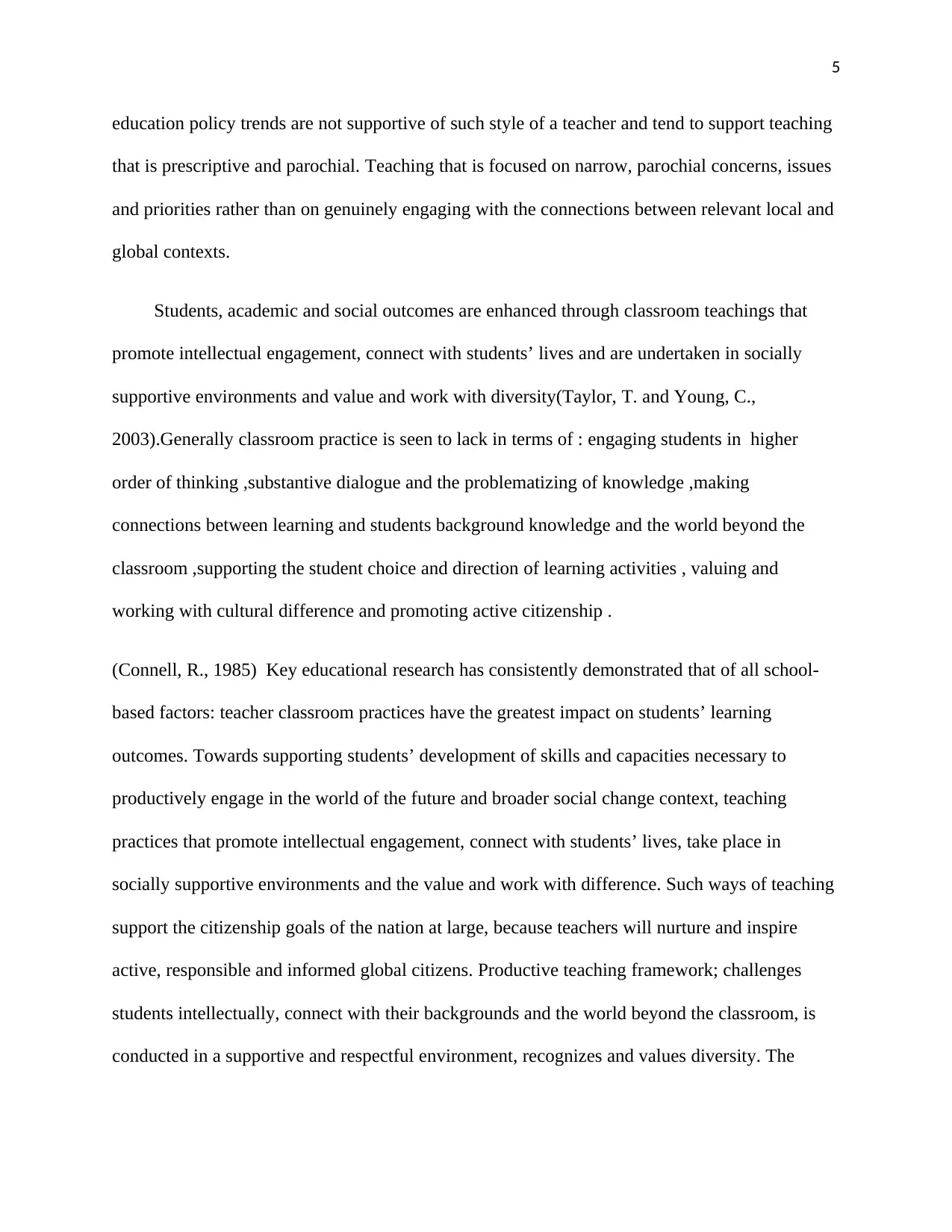
5
education policy trends are not supportive of such style of a teacher and tend to support teaching
that is prescriptive and parochial. Teaching that is focused on narrow, parochial concerns, issues
and priorities rather than on genuinely engaging with the connections between relevant local and
global contexts.
Students, academic and social outcomes are enhanced through classroom teachings that
promote intellectual engagement, connect with students’ lives and are undertaken in socially
supportive environments and value and work with diversity(Taylor, T. and Young, C.,
2003).Generally classroom practice is seen to lack in terms of : engaging students in higher
order of thinking ,substantive dialogue and the problematizing of knowledge ,making
connections between learning and students background knowledge and the world beyond the
classroom ,supporting the student choice and direction of learning activities , valuing and
working with cultural difference and promoting active citizenship .
(Connell, R., 1985) Key educational research has consistently demonstrated that of all school-
based factors: teacher classroom practices have the greatest impact on students’ learning
outcomes. Towards supporting students’ development of skills and capacities necessary to
productively engage in the world of the future and broader social change context, teaching
practices that promote intellectual engagement, connect with students’ lives, take place in
socially supportive environments and the value and work with difference. Such ways of teaching
support the citizenship goals of the nation at large, because teachers will nurture and inspire
active, responsible and informed global citizens. Productive teaching framework; challenges
students intellectually, connect with their backgrounds and the world beyond the classroom, is
conducted in a supportive and respectful environment, recognizes and values diversity. The
education policy trends are not supportive of such style of a teacher and tend to support teaching
that is prescriptive and parochial. Teaching that is focused on narrow, parochial concerns, issues
and priorities rather than on genuinely engaging with the connections between relevant local and
global contexts.
Students, academic and social outcomes are enhanced through classroom teachings that
promote intellectual engagement, connect with students’ lives and are undertaken in socially
supportive environments and value and work with diversity(Taylor, T. and Young, C.,
2003).Generally classroom practice is seen to lack in terms of : engaging students in higher
order of thinking ,substantive dialogue and the problematizing of knowledge ,making
connections between learning and students background knowledge and the world beyond the
classroom ,supporting the student choice and direction of learning activities , valuing and
working with cultural difference and promoting active citizenship .
(Connell, R., 1985) Key educational research has consistently demonstrated that of all school-
based factors: teacher classroom practices have the greatest impact on students’ learning
outcomes. Towards supporting students’ development of skills and capacities necessary to
productively engage in the world of the future and broader social change context, teaching
practices that promote intellectual engagement, connect with students’ lives, take place in
socially supportive environments and the value and work with difference. Such ways of teaching
support the citizenship goals of the nation at large, because teachers will nurture and inspire
active, responsible and informed global citizens. Productive teaching framework; challenges
students intellectually, connect with their backgrounds and the world beyond the classroom, is
conducted in a supportive and respectful environment, recognizes and values diversity. The
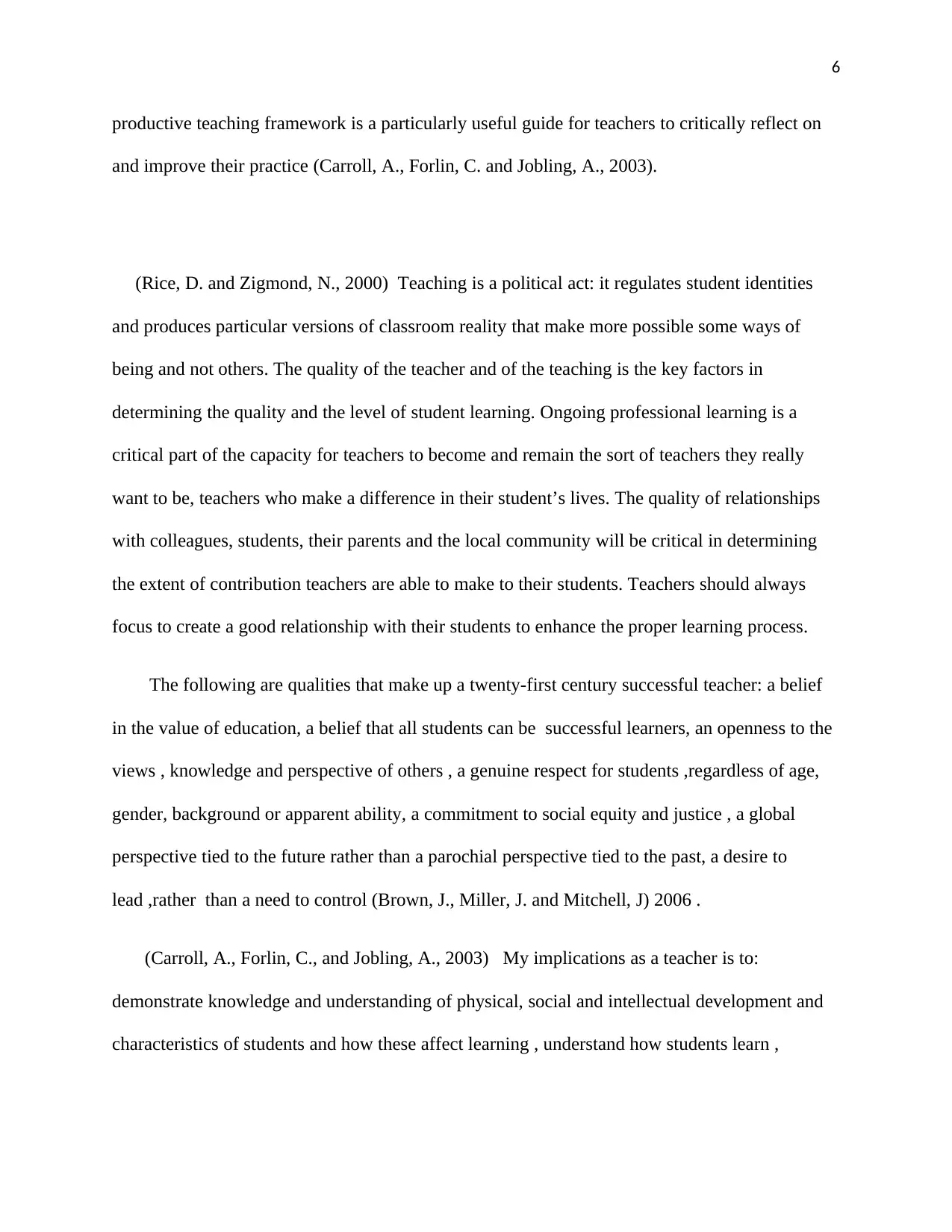
6
productive teaching framework is a particularly useful guide for teachers to critically reflect on
and improve their practice (Carroll, A., Forlin, C. and Jobling, A., 2003).
(Rice, D. and Zigmond, N., 2000) Teaching is a political act: it regulates student identities
and produces particular versions of classroom reality that make more possible some ways of
being and not others. The quality of the teacher and of the teaching is the key factors in
determining the quality and the level of student learning. Ongoing professional learning is a
critical part of the capacity for teachers to become and remain the sort of teachers they really
want to be, teachers who make a difference in their student’s lives. The quality of relationships
with colleagues, students, their parents and the local community will be critical in determining
the extent of contribution teachers are able to make to their students. Teachers should always
focus to create a good relationship with their students to enhance the proper learning process.
The following are qualities that make up a twenty-first century successful teacher: a belief
in the value of education, a belief that all students can be successful learners, an openness to the
views , knowledge and perspective of others , a genuine respect for students ,regardless of age,
gender, background or apparent ability, a commitment to social equity and justice , a global
perspective tied to the future rather than a parochial perspective tied to the past, a desire to
lead ,rather than a need to control (Brown, J., Miller, J. and Mitchell, J) 2006 .
(Carroll, A., Forlin, C., and Jobling, A., 2003) My implications as a teacher is to:
demonstrate knowledge and understanding of physical, social and intellectual development and
characteristics of students and how these affect learning , understand how students learn ,
productive teaching framework is a particularly useful guide for teachers to critically reflect on
and improve their practice (Carroll, A., Forlin, C. and Jobling, A., 2003).
(Rice, D. and Zigmond, N., 2000) Teaching is a political act: it regulates student identities
and produces particular versions of classroom reality that make more possible some ways of
being and not others. The quality of the teacher and of the teaching is the key factors in
determining the quality and the level of student learning. Ongoing professional learning is a
critical part of the capacity for teachers to become and remain the sort of teachers they really
want to be, teachers who make a difference in their student’s lives. The quality of relationships
with colleagues, students, their parents and the local community will be critical in determining
the extent of contribution teachers are able to make to their students. Teachers should always
focus to create a good relationship with their students to enhance the proper learning process.
The following are qualities that make up a twenty-first century successful teacher: a belief
in the value of education, a belief that all students can be successful learners, an openness to the
views , knowledge and perspective of others , a genuine respect for students ,regardless of age,
gender, background or apparent ability, a commitment to social equity and justice , a global
perspective tied to the future rather than a parochial perspective tied to the past, a desire to
lead ,rather than a need to control (Brown, J., Miller, J. and Mitchell, J) 2006 .
(Carroll, A., Forlin, C., and Jobling, A., 2003) My implications as a teacher is to:
demonstrate knowledge and understanding of physical, social and intellectual development and
characteristics of students and how these affect learning , understand how students learn ,
⊘ This is a preview!⊘
Do you want full access?
Subscribe today to unlock all pages.

Trusted by 1+ million students worldwide
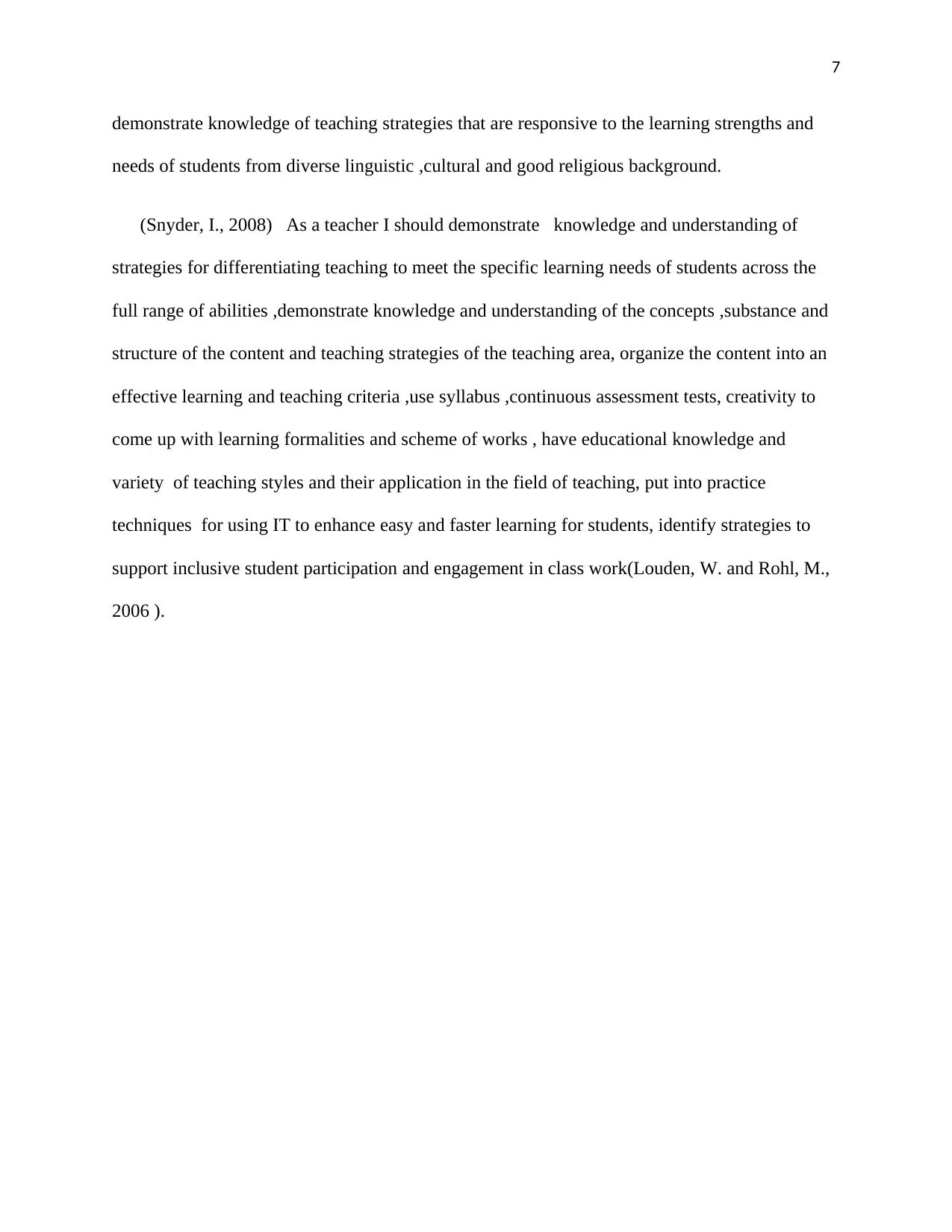
7
demonstrate knowledge of teaching strategies that are responsive to the learning strengths and
needs of students from diverse linguistic ,cultural and good religious background.
(Snyder, I., 2008) As a teacher I should demonstrate knowledge and understanding of
strategies for differentiating teaching to meet the specific learning needs of students across the
full range of abilities ,demonstrate knowledge and understanding of the concepts ,substance and
structure of the content and teaching strategies of the teaching area, organize the content into an
effective learning and teaching criteria ,use syllabus ,continuous assessment tests, creativity to
come up with learning formalities and scheme of works , have educational knowledge and
variety of teaching styles and their application in the field of teaching, put into practice
techniques for using IT to enhance easy and faster learning for students, identify strategies to
support inclusive student participation and engagement in class work(Louden, W. and Rohl, M.,
2006 ).
demonstrate knowledge of teaching strategies that are responsive to the learning strengths and
needs of students from diverse linguistic ,cultural and good religious background.
(Snyder, I., 2008) As a teacher I should demonstrate knowledge and understanding of
strategies for differentiating teaching to meet the specific learning needs of students across the
full range of abilities ,demonstrate knowledge and understanding of the concepts ,substance and
structure of the content and teaching strategies of the teaching area, organize the content into an
effective learning and teaching criteria ,use syllabus ,continuous assessment tests, creativity to
come up with learning formalities and scheme of works , have educational knowledge and
variety of teaching styles and their application in the field of teaching, put into practice
techniques for using IT to enhance easy and faster learning for students, identify strategies to
support inclusive student participation and engagement in class work(Louden, W. and Rohl, M.,
2006 ).
Paraphrase This Document
Need a fresh take? Get an instant paraphrase of this document with our AI Paraphraser
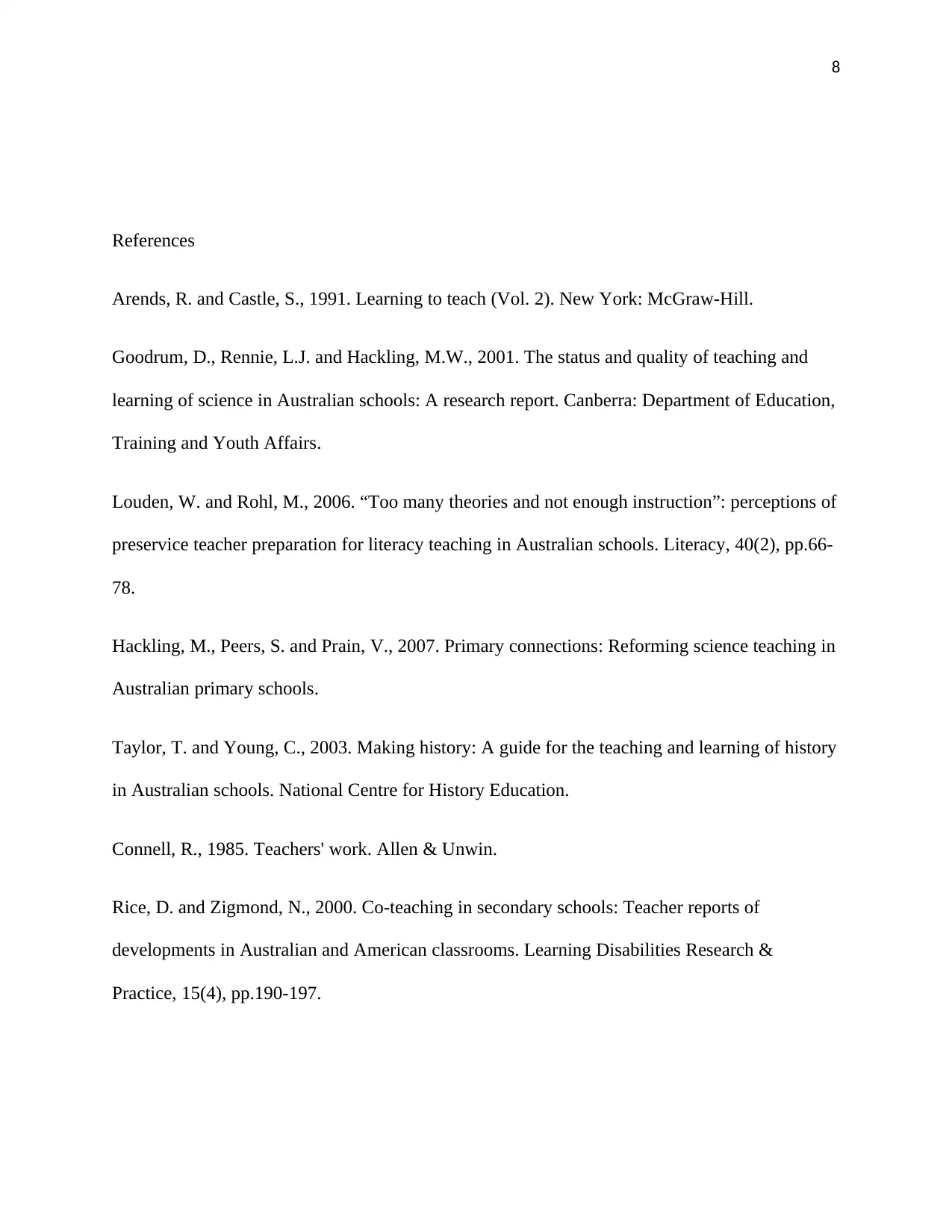
8
References
Arends, R. and Castle, S., 1991. Learning to teach (Vol. 2). New York: McGraw-Hill.
Goodrum, D., Rennie, L.J. and Hackling, M.W., 2001. The status and quality of teaching and
learning of science in Australian schools: A research report. Canberra: Department of Education,
Training and Youth Affairs.
Louden, W. and Rohl, M., 2006. “Too many theories and not enough instruction”: perceptions of
preservice teacher preparation for literacy teaching in Australian schools. Literacy, 40(2), pp.66-
78.
Hackling, M., Peers, S. and Prain, V., 2007. Primary connections: Reforming science teaching in
Australian primary schools.
Taylor, T. and Young, C., 2003. Making history: A guide for the teaching and learning of history
in Australian schools. National Centre for History Education.
Connell, R., 1985. Teachers' work. Allen & Unwin.
Rice, D. and Zigmond, N., 2000. Co-teaching in secondary schools: Teacher reports of
developments in Australian and American classrooms. Learning Disabilities Research &
Practice, 15(4), pp.190-197.
References
Arends, R. and Castle, S., 1991. Learning to teach (Vol. 2). New York: McGraw-Hill.
Goodrum, D., Rennie, L.J. and Hackling, M.W., 2001. The status and quality of teaching and
learning of science in Australian schools: A research report. Canberra: Department of Education,
Training and Youth Affairs.
Louden, W. and Rohl, M., 2006. “Too many theories and not enough instruction”: perceptions of
preservice teacher preparation for literacy teaching in Australian schools. Literacy, 40(2), pp.66-
78.
Hackling, M., Peers, S. and Prain, V., 2007. Primary connections: Reforming science teaching in
Australian primary schools.
Taylor, T. and Young, C., 2003. Making history: A guide for the teaching and learning of history
in Australian schools. National Centre for History Education.
Connell, R., 1985. Teachers' work. Allen & Unwin.
Rice, D. and Zigmond, N., 2000. Co-teaching in secondary schools: Teacher reports of
developments in Australian and American classrooms. Learning Disabilities Research &
Practice, 15(4), pp.190-197.
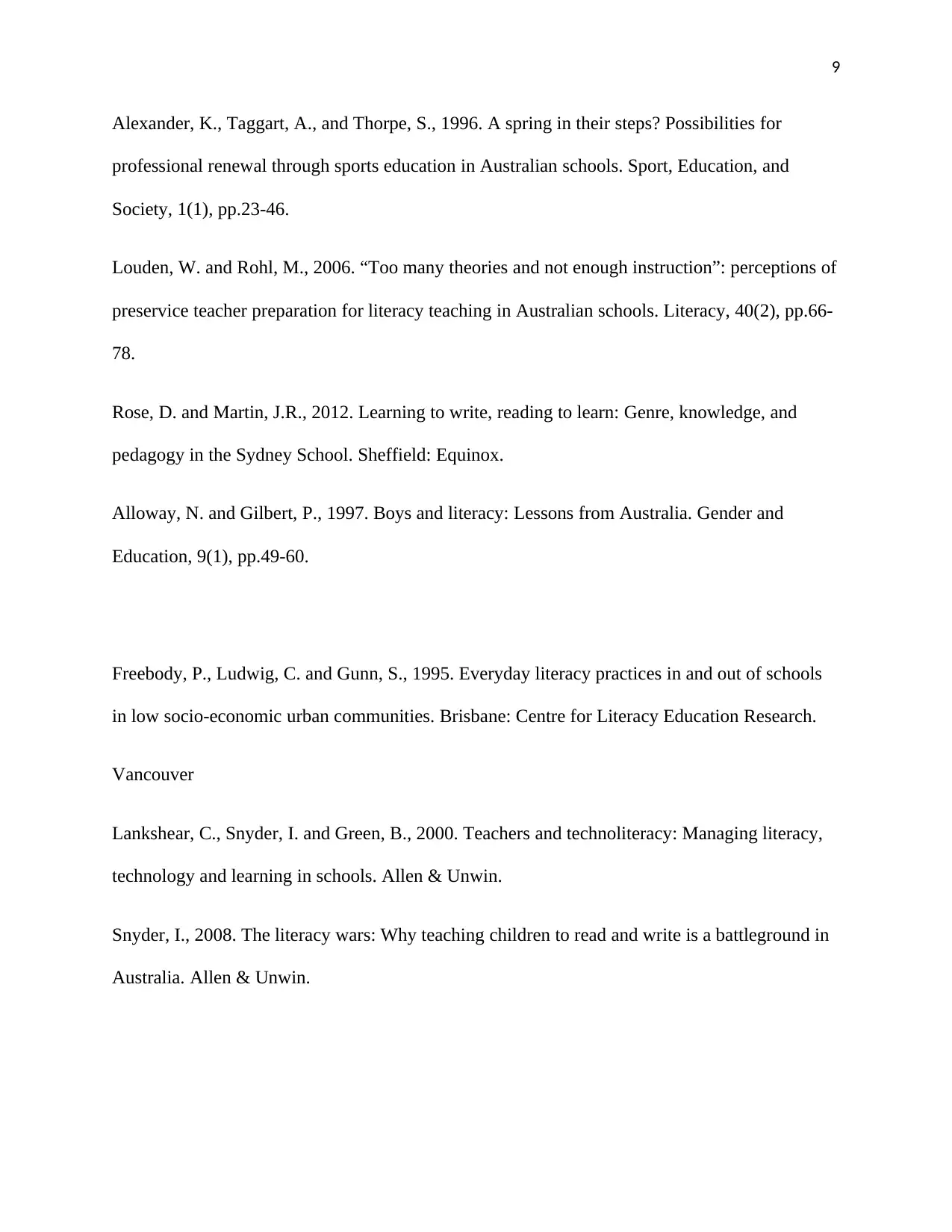
9
Alexander, K., Taggart, A., and Thorpe, S., 1996. A spring in their steps? Possibilities for
professional renewal through sports education in Australian schools. Sport, Education, and
Society, 1(1), pp.23-46.
Louden, W. and Rohl, M., 2006. “Too many theories and not enough instruction”: perceptions of
preservice teacher preparation for literacy teaching in Australian schools. Literacy, 40(2), pp.66-
78.
Rose, D. and Martin, J.R., 2012. Learning to write, reading to learn: Genre, knowledge, and
pedagogy in the Sydney School. Sheffield: Equinox.
Alloway, N. and Gilbert, P., 1997. Boys and literacy: Lessons from Australia. Gender and
Education, 9(1), pp.49-60.
Freebody, P., Ludwig, C. and Gunn, S., 1995. Everyday literacy practices in and out of schools
in low socio-economic urban communities. Brisbane: Centre for Literacy Education Research.
Vancouver
Lankshear, C., Snyder, I. and Green, B., 2000. Teachers and technoliteracy: Managing literacy,
technology and learning in schools. Allen & Unwin.
Snyder, I., 2008. The literacy wars: Why teaching children to read and write is a battleground in
Australia. Allen & Unwin.
Alexander, K., Taggart, A., and Thorpe, S., 1996. A spring in their steps? Possibilities for
professional renewal through sports education in Australian schools. Sport, Education, and
Society, 1(1), pp.23-46.
Louden, W. and Rohl, M., 2006. “Too many theories and not enough instruction”: perceptions of
preservice teacher preparation for literacy teaching in Australian schools. Literacy, 40(2), pp.66-
78.
Rose, D. and Martin, J.R., 2012. Learning to write, reading to learn: Genre, knowledge, and
pedagogy in the Sydney School. Sheffield: Equinox.
Alloway, N. and Gilbert, P., 1997. Boys and literacy: Lessons from Australia. Gender and
Education, 9(1), pp.49-60.
Freebody, P., Ludwig, C. and Gunn, S., 1995. Everyday literacy practices in and out of schools
in low socio-economic urban communities. Brisbane: Centre for Literacy Education Research.
Vancouver
Lankshear, C., Snyder, I. and Green, B., 2000. Teachers and technoliteracy: Managing literacy,
technology and learning in schools. Allen & Unwin.
Snyder, I., 2008. The literacy wars: Why teaching children to read and write is a battleground in
Australia. Allen & Unwin.
⊘ This is a preview!⊘
Do you want full access?
Subscribe today to unlock all pages.

Trusted by 1+ million students worldwide
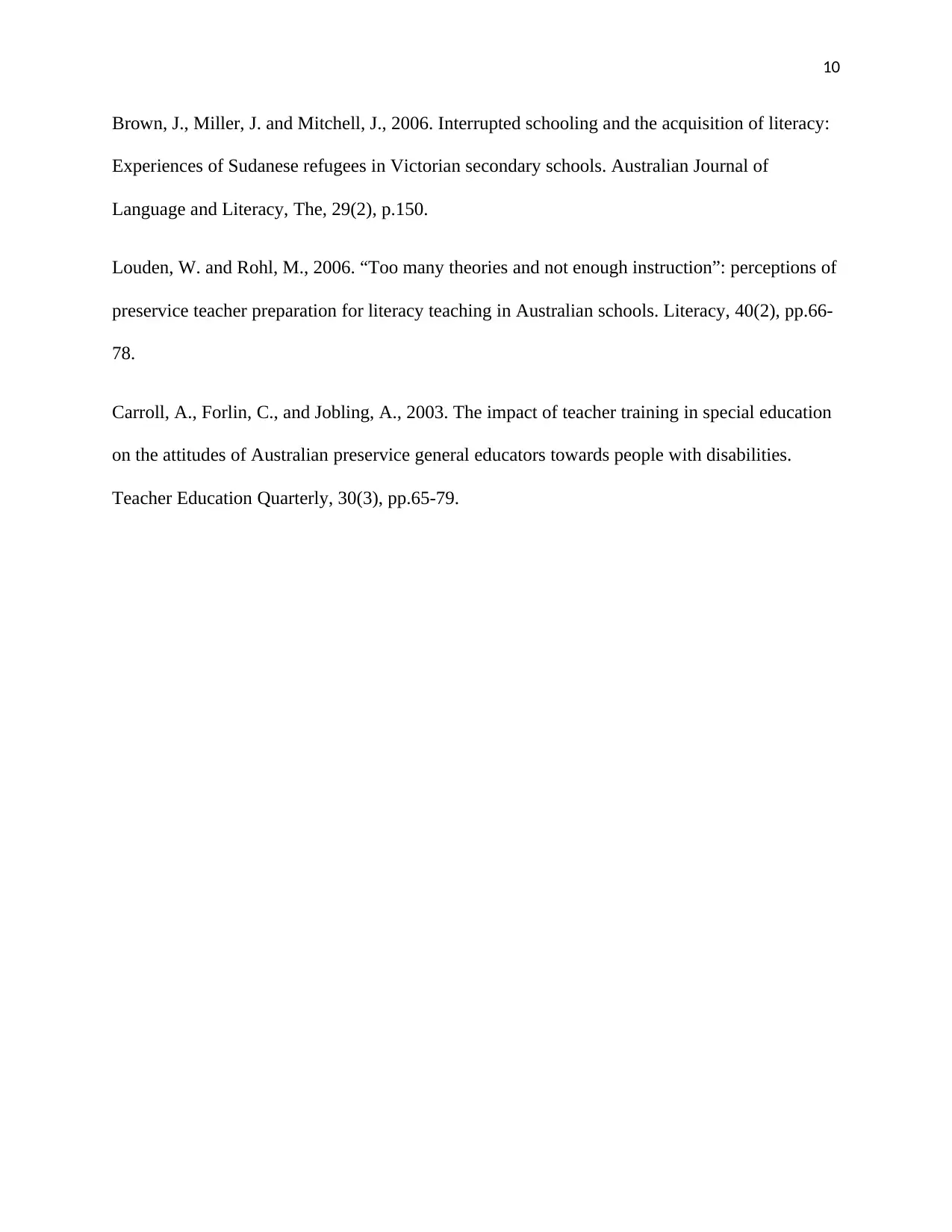
10
Brown, J., Miller, J. and Mitchell, J., 2006. Interrupted schooling and the acquisition of literacy:
Experiences of Sudanese refugees in Victorian secondary schools. Australian Journal of
Language and Literacy, The, 29(2), p.150.
Louden, W. and Rohl, M., 2006. “Too many theories and not enough instruction”: perceptions of
preservice teacher preparation for literacy teaching in Australian schools. Literacy, 40(2), pp.66-
78.
Carroll, A., Forlin, C., and Jobling, A., 2003. The impact of teacher training in special education
on the attitudes of Australian preservice general educators towards people with disabilities.
Teacher Education Quarterly, 30(3), pp.65-79.
Brown, J., Miller, J. and Mitchell, J., 2006. Interrupted schooling and the acquisition of literacy:
Experiences of Sudanese refugees in Victorian secondary schools. Australian Journal of
Language and Literacy, The, 29(2), p.150.
Louden, W. and Rohl, M., 2006. “Too many theories and not enough instruction”: perceptions of
preservice teacher preparation for literacy teaching in Australian schools. Literacy, 40(2), pp.66-
78.
Carroll, A., Forlin, C., and Jobling, A., 2003. The impact of teacher training in special education
on the attitudes of Australian preservice general educators towards people with disabilities.
Teacher Education Quarterly, 30(3), pp.65-79.
1 out of 10
Related Documents
Your All-in-One AI-Powered Toolkit for Academic Success.
+13062052269
info@desklib.com
Available 24*7 on WhatsApp / Email
![[object Object]](/_next/static/media/star-bottom.7253800d.svg)
Unlock your academic potential
Copyright © 2020–2026 A2Z Services. All Rights Reserved. Developed and managed by ZUCOL.





